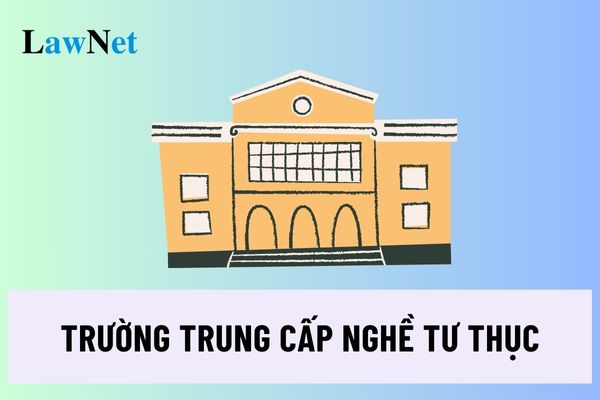Vietnam: What is the organizational structure of a private vocational post-secondary school?
What is the organizational structure of a private vocational post-secondary school in Vietnam?
Based on Article 10 of the Law on Vocational Education 2014, the provisions are as follows:
Organizational structure of vocational education institutions
1. Organizational structure of a public or private vocational post-secondary school or college includes:
a) School councils of public vocational post-secondary schools, or colleges; School council of private vocational post-secondary schools or colleges;
b) Principals, Vice Principals;
c) Administrative departments;
d) Faculties, or subjects;
dd) Advisory boards;
e) School branch; organizations for scientific and technology research; organizations for training services, scientific research and application development; internal business facilities (if any).
2. Organizational structure of a public or private vocational training center includes:
a) Directors, Deputy Directors;
b) Administrative departments;
c) Subjects;
d) Advisory boards;
dd) Organizations for training services; internal business facilities (if any).
3. The foreign-invested vocational education institutions shall be given autonomy in organizational structure.
The organizational structure of a private vocational post-secondary school in Vietnam includes the following 6 components:
- School council;
- Principals, Vice Principals;
- Administrative departments;
- Faculties, or subjects;
- Advisory boards;
- School branch; organizations for scientific and technology research; organizations for training services, scientific research and application development; internal business facilities (if any).

What is the organizational structure of a private vocational post-secondary school in Vietnam? (Image from the Internet)
When can a private vocational post-secondary school in Vietnam establish an Enrollment Council?
Based on Article 3 of Circular 05/2021/TT-BLDTBXH, the provisions are as follows:
Enrollment time, eligibility and methods
1. Enrollment may be open one or more than one time a year.
2. Enrollment eligibility:
a) For post-secondary programs:
Graduates of lower secondary schools and equivalent and institutions of higher levels.
b) For college programs:
- Holders of high school diplomas;
- Persons having an post-secondary diploma and certificate of completion of general education program or certificate of adequate upper secondary cultural knowledge or having learned adequate upper secondary education knowledge and passed an examination for such knowledge according to regulations.
...
Based on Article 6 of Circular 05/2021/TT-BLDTBXH, the provisions are as follows:
Organizational structure, composition, duties and powers of Enrollment Councils
1. The school principal has the power to decide establishment of an Enrollment Council to direct tasks concerning Enrollment.
2. Composition of the Enrollment Council:
a) Chairperson: principal or deputy principal;
b) Deputy chairperson: deputy principal or head of training division;
c) Standing member: head or deputy head of academic affairs office (or educational testing office or unit in charge of Enrollment under the principal’s decision);
d) Members: some office heads, department heads, teachers, lecturers and information technology officials decided by the principal.
In a private vocational post-secondary school, the Enrollment Council is established under the decision of the Principal, and the Enrollment Council will manage tasks related to the enrollment process.
Enrollment can be conducted once or multiple times a year.
What are the enrollment criteria for a private vocational post-secondary school in Vietnam?
Based on Article 3 of Circular 05/2021/TT-BLDTBXH, private vocational post-secondary schools admit students who have graduated from lower secondary schools and equivalent or higher.
The conditions for lower secondary school graduation assessment are provided in Article 4 of the Regulation on graduation recognition in lower secondary education issued together with Circular 31/2023/TT-BGDDT as follows:
(1) Not older than 21 years old (in calendar year) if they finish Formal education program for lower secondary education; or are at least 15 years old (in calendar year) if they finish Continuous education program for lower secondary education.
In case of students returning from overseas, participating in accelerated study, attending class at an older age, regulations on age and grades of the Ministry of Education and Training.
(2) Have completed Formal education program for lower secondary education or Continuous education program for lower secondary education.
(3) Have sufficient documents as prescribed in Article 6 of the Regulation on graduation recognition in lower secondary education issued together with Circular 31/2023/TT-BGDDT:
- In respect of students finishing ninth grade in education institutions, their application shall consist of their school reports.
- In respect of students who do not fall under the above case, application for graduation recognition consists of:
+ Written application for graduation recognition;
+ Legitimate copies of birth certificate or ID Card;
+ Original copies of school reports or printed copies of electronic school reports verified by education institutions where the students finish ninth grade.
If a student loses original copies of his/her school report or does not possess printed copies of electronic school report, he/she must provide written verification of disciplinary and academic results of education institutions where he/she finishes ninth grade.

